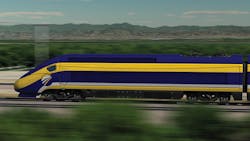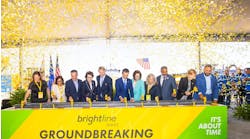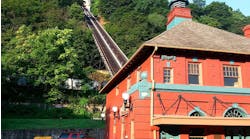The U.S. Department of Transportation's (USDOT) Federal Railroad Administration (FRA) has notified the California High-Speed Rail Authority (CHSRA) that it intends to cancel the $929 million in grant funding obligated to the project in 2011 on March 5, 2019 and will explore options seeking the return of nearly $2.5 billion previously awarded and given to the project.
A letter sent to CHSRA from FRA Administrator Ronald L. Batory cited four main points as to why the Cooperative Agreement would be cancelled and include:
- CHSRA’s failures relating to the required state expenditures necessary to advance the project according to the project’s schedule.
- FRA’s determination that CHSRA will not complete the project by 2022, which is the end of the agreement’s period of performance.
- FRA says CHSRA has failed to provide timely and satisfactory financial reports and other related deliverables
- FRA says it has regularly communicated its concerns to CHSRA, but has not seen appropriate correction actions taken to ensure delivery of the project.
This is the latest blow to the high-speed rail project, which intended, upon full build out, to connect eight of California’s 10 most populated cities across 800 miles of track spanning from San Diego to Sacramento. Phase 1 of the project was to run between San Francisco and the Los Angeles basin through the Central Valley with extensions north to Sacramento and south to San Diego planned for later phases.
California Gov. Gavin Newsom outlined a new path forward for the project in his State of the State speech Feb. 12, which would see the completion of Phase 1 environmental work and the continuation of regional projects north and south of the planned high-speed corridor.
The governor said he ordered transparency measures because walking away from the project in its entirety would be a waste of money and effort.
“We’re going to hold contractors and consultants accountable to explain how taxpayer dollars are spent – including change orders, cost overruns, even travel expenses. It’s going online, for everybody to see,” said Gov. Newsom. “You’re also going to see some governance changes…Because, at the end of the day, transportation and economic development must go hand-in-hand.”
Administrator Batory’s letter referenced the governor’s speech said it “represents a significant retreat from the state’s initial vision and commitment and frustrates the purpose for which federal funding was awarded.”
The letter noted that should CHSRA have information demonstrating it has satisfied the Cooperative Agreement’s obligations, is making reasonable progress to deliver the project and that Gov. Newsom’s announcement does not fundamentally change the purpose of the overall project for which the funding was awarded, FRA would take the information into consideration before taking final action to terminate the funding agreement.
Governor’s office vows to fight for funds
In response to the letter, Gov. Newsom issued a statement that read, “It’s no coincidence that the administration’s threat comes 24 hours after California led 16 states in challenging the President’s farcical ‘national emergency.’ The President even tied the two issues together in a tweet this morning. This is clear political retribution by President Trump, and we won’t sit idly by. This is California’s money, and we are going to fight for it.”
To provide context to the governor’s response, following his State of the State speech, President Donald Trump tweeted that the high-speed rail project was a waste of money and federal money given to the project should be returned.
President Trump’s tweet on Feb. 13 read, “California has been forced to cancel the massive bullet train project after having spent and wasted many billions of dollars. They owe the Federal Government three and a half billion dollars. We want that money back now. Whole project is a “green” disaster!”
Gov. Newsom responded to the President with a tweet of his own that read, “Fake news. We’re building high-speed rail, connecting the Central Valley and beyond. This is CA’s money, allocated by Congress for this project. We’re not giving it back. The train is leaving the station — better get on board! (Also, desperately searching for some wall $$??)”
The governor has also been a vocal opponent of the National Emergency Declaration to divert military spending to build physical barriers at the southern border. California joined 15 other states in a lawsuit challenging the declaration.
The President tweeted twice about the high-speed rail project the morning of Feb. 19.
His first tweet read, “As I predicted, 16 states, led mostly by Open Border Democrats and the Radical Left, have filed a lawsuit in, of course, the 9th Circuit! California, the state that has wasted billions of dollars on their out of control Fast Train, with no hope of completion, seems in charge!”
A second tweet followed shortly after that read, “The failed Fast Train project in California, where the cost overruns are becoming world record setting, is hundreds of times more expensive than the desperately needed Wall!”
The President's tweets spilled over into the morning of Feb. 20 with a tweet again calling for the return of the federal money already spent on the project.



